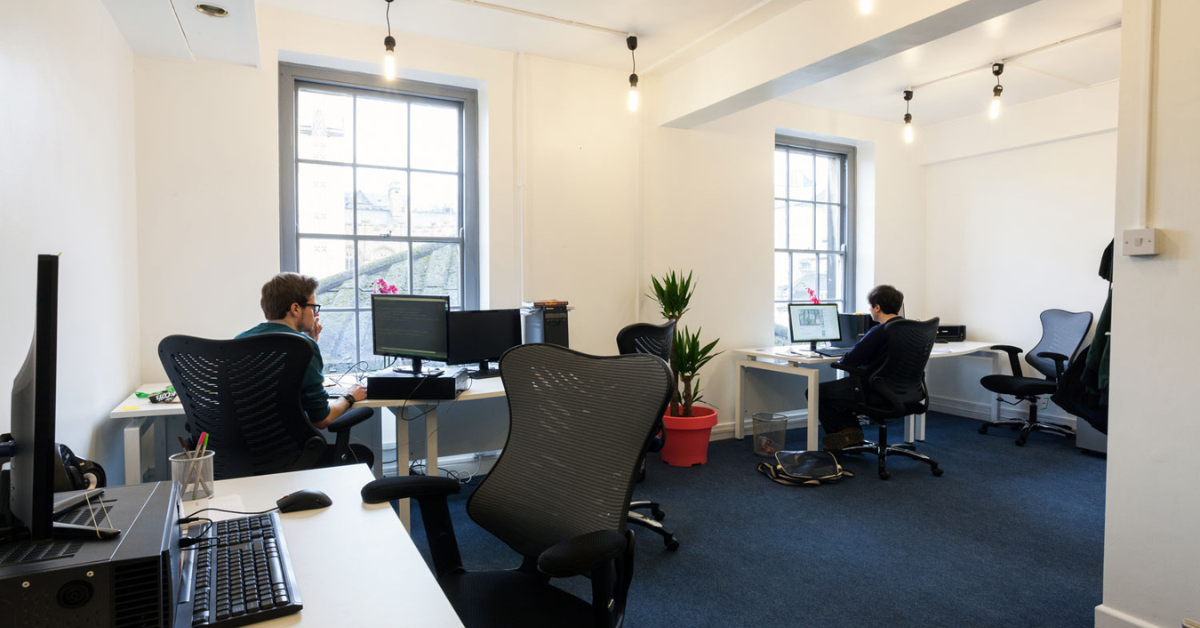The Pros and Cons of Hot Desking vs. Desk Hoteling

How many desks in your office sit unused during the work week?
Before the pandemic, Inc. Magazine reported that as much as 40 percent of an office’s dedicated desk space was empty on any given day. Then COVID-19 hit the United States, and employees abandoned office cubicles for work-from-home setups in droves.
As workers return to their offices, more companies are using shared seating schedules to maximize space. Envoy data suggests that the demand for flexible office environments is increasing rapidly, with hot-desk bookings growing 95 percent from April to May 2021. By eliminating assigned seating, companies reduce their physical footprints and allow employees to switch freely between remote and office work.
Hot desking and desk hoteling have emerged as two of the most popular office layouts for companies with hybrid work arrangements. Though people often use the terms interchangeably, there are several key differences between the two occupancy strategies.
Hot Desking
Hot desking is a method of allowing workers to occupy workspaces on a first-come, first-served basis. This kind of seating arrangement is not new, but it is currently gaining traction in the corporate world.
Consider how a college library might use a system similar to hot desking, for example. Students show up looking for a place to learn or work, and they can claim a desk depending on their daily goals. Someone looking for a quiet corner to study may choose a quiet area, while a team working on a group project may search for a more social space. If nothing is available, they can wait until a spot opens up or try again another day.
Hot desking may be ideal for some companies because of how easily they can implement it and accommodate last-minute changes in employee schedules. Businesses adopting hot desking in their offices tout a few key benefits over desk hoteling.
Pros of Hot Desking
Desks can be available on short notice.
Hot desking allows employees to drop into the office at a moment’s notice without worrying about reserving a spot in advance. Companies in industries that require frequent travel, such as consulting or journalism, may appreciate the ease and simplicity of hot desking.
There is less monotony in the day-to-day work.
With a hot-desking arrangement, workers can switch seats every day in the office if they’d like. Changing scenery during the work week — even just across the hall — can boost employee productivity and satisfaction.
Workers have complete autonomy.
Companies that embrace hot desking give their teams complete control over the day-to-day organization of the office. Employees can switch between a quiet desk and a collaborative space in any given week without having to check in first.
Cons of Hot Desking
It’s a free for all.
The complete flexibility of hot desking means that sometimes people may show up to the office and not be able to find space to work. If employees have long commutes to the office, this arrangement may deter them from ever leaving their homes.
Employees may struggle to find privacy.
Some hot-desking setups may have limited spaces for private calls, leaving employees in the lurch if they don’t arrive early enough to snag spots. Industries with confidentiality agreements may find this challenging. A Community Care survey found that more than eight in 10 social workers don’t believe hot-desking is compatible with their jobs.
Workers can waste time finding the perfect spot.
Constantly changing desks requires employees to spend the first 10 minutes of every workday searching for a spot and getting set up rather than jumping right into their daily assignments.
Desk Hoteling
Though similar, desk hoteling typically involves an online booking system, allowing employees to reserve unassigned desks in advance for extended periods.
Desk hoteling gets its name because of how it mimics the hospitality industry. Like how a family can book hotel space together and checks in upon arrival, a team can reserve desks near each other and confirm their presence in the office that day. At the end of the reservation period, an office manager can quickly prepare the desks for the next users by ensuring that everything is clean and devoid of personal belongings.
Desk hoteling may work better than hot desking for industries with more departmental collaboration and in-office presentations, such as finance, marketing and information technology. Here are the main benefits and drawbacks of a desk-hoteling office environment.
Pros of Desk Hoteling
It prevents overcrowding or double-booking.
Once an employee reserves a desk, the booking platform updates to show that the space is occupied, thus avoiding the awkwardness of two people gunning for the same spot. Office managers should leverage reservation systems to manage occupancy levels in real time and collect data about who is coming into the office.
Colleagues can more quickly find each other.
Rather than searching through a large office to find someone, a worker in a desk-hoteling office can check the online booking platform to see exactly where everyone is for the day – easily allowing for last-minute meetings or brainstorming sessions.
It improves socialization and collaboration.
In a hot-desking environment, teams may struggle to find available desks together. Desk hoteling makes it simple for groups to save space in advance for large-scale meetings or collaboration.
Cons of Desk Hoteling
It’s less responsive to sudden, urgent needs.
Employees in a desk-hoteling office may reserve workspaces weeks in advance, making it difficult for people with rapidly-changing assignments or sudden emergencies to find the space they need.
Reservation systems involve more complicated logistics.
Online booking platforms may introduce more room for error, adding troubleshooting responsibilities to the already-busy office manager. The reservation technology can also be costly, adding a new item to a company’s budget sheet.
It may add a layer of stress for employees.
Workers who forget to reserve desks in advance may be scrambling to find a spot conducive to productivity, regardless of how early they arrive. In a desk-hoteling environment, the same people may book the best workspaces every week, leaving the less popular desks for everyone else. Envoy found that 43 percent of companies have at least one desk that accounts for more than 10 percent of total bookings.
Hot desking and desk hoteling are only the beginning of the future of flexible workplaces. As companies increasingly adopt hybrid schedules, unassigned seating is just one way to accommodate the new preferences of workers.
Are you looking to restructure your office into a hot-desking or desk-hoteling environment? The Armstrong Company – Dallas can help. Learn about our end-to-end commercial moving services by calling 972.242.0511 or requesting a free quote online.
